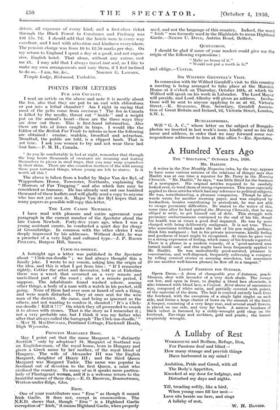POINTS FROM LETTERS FUR AND CRUELTY.
I read an article on the above and note it is mostly about the fox, also that they are put to an end with chloroform or put into a lethal chamber ? Am I right in saying that most of the pelts come from overseas ? The fox in Canada is killed by the needle, throat cut " inside " and a weight put on the animal's heart—these are the three ways they are done out there. This is first-hand information. Also 'there are lots of foxes caught in traps. I would like the Editor of the British Fur Trade to inform us how the following are obtained : ermine, sealskin, broadtail and astrachan. Broadtail, the public are told, is a clipped lamb. That is riot true. I ask you women to try and not wear these last four furs.—F. M. H., Canada.
"As you lie comfortably in bed at night, remember that through the long hours thousands of creatures are moaning and tearing themselves to pieces in steel traps, that you may wrap yourselves in their skins. There are also countless mothers of the wild among these poor tortured things, whose young are left to starve. Is it worth all this ?
The above is taken from a leaflet by Major Van der Byl, of Wappenham House, Toweester, Northants, explaining the " Horrors of Fur Trapping" and also which furs may be considered as humane. He has already sent out one hundred thousand of these leaflets and will gladly send a copy to anyone who has not yet seen it. Major Van der Byl hopes that as many papers as possible will copy this letter.
TIIE LATE CANON NEWBOLT.
. I have read with pleasure and entire agreement your paragraph in the current number of the Spectator about the late Canon Newbolt. Forty-five years ago, when I was a young assistant curate, he conducted a quiet day for clergy at Groombridge. In common with the other clerics I was deeply impressed by his addresses. Without doubt, he was a preacher of a very high and cultured type.—J. I'. BACON Pniturs, Burgess Hill, Sussex.
•
CLICK-MA-DOODLE.
A fortnight ago a letter was published in the Spectator about " Click-ma-doodle " ; we had always thought this a family joke. I wrote to my cousin, asking him the origin of the idea, and this is what I got from him : "If I remember rightly, Cottier the artist and decorator, told us at Eiderline there was a wreck that occurred on a very remote and uncivilized part of the coast ; also at a remote period, I suppose. The inhabitants found washed ashore, among other things, a body of a man with a watch in his pocket, still going. None of them had ever seen or heard of such a thing, and were much disturbed. They at once sent for the wise man of the district. He came, and being as ignorant as the others, and not wanting to confess it, shouted : It's a Click- ma-doodle! Kill it !!!' On which they all proceeded to smash it to atoms with stones. That is the story as I remember it ; not a very probable one, but I think it was my father who after that always called the barograph 'The Click-ma-doodle.'" —MAY M. MacDouGALL, Pentland Cottage, Flackwell Heath, High Wycombe.
PRINCESS MARGARET ROSE,
May I point out that the name Margaret is "distinctly Scottish" only by adoption? St. Margaret of Scotland was an Englishwoman, of the royal house, born in Hungary and given a Greek name by her mother, of the royal blood of Hungary. The wife of Alexander III was the English Margaret, daughter of Henry III; and the third Queen Margaret was Margaret Tudor. The name was popular in Scotland out of devotion to the first Queen, a saint who civilized the country. To many of us it speaks more particu- larly of Plantagenet women, and it is a welcome return to the _beautiful names of those days.—E. 0. BROWNE, Bournstream, Wotton-under-Edge, Glos.
ERSE.
One of your contributors uses " Erse " as though it meant Irish Gaelic. It does not, except in crosswordese. The ,N.E.D. shows that, though " Erse " is a Highland Gaelic corruption of" Irish," it means Highland Gaelic, when properly used, and not the language of this country. Indeed, the word "Irish " was formerly usedin the Highlands to mean Highland Gaelic.—Nnimo U. DYCE, Antrim Road, Belfast.
QUOTATIONS.
' I should be glad if some of your readers could give me the origin of the following expressions :
" Make no bones-of it."
"Would not put a tooth in it."
and oblige.—Uisma.
Silt WILFRED GRENFELL'S VISIT.
In connexion with Sir Wilfred Grenfell's visit to this country a meeting is being arranged to take place at the Mansion House at 3 o'clock on Thursday, October 16th, at which Sir Wilfred will speak on his work in Labrador. The Lord Mayor will preside, and Lord Allenby will given an address. Invita- tions will be sent to anyone applying to us at 82, Victoria Street—K. SPALDING, Hon. Secretary, Grenfell Associa- tion of Great Britain and Ireland, 82, Victoria Street, London, S.W. 1.
BUNGALOPHODIA.
Will "G. A. C.," whose letter on the subject of Bungale. phobia we inserted in last week's issue, kindly send us his full name and address, in order that we may forward some cor- respondence addressed to him at this oflice I—En. Spectator,




















































 Previous page
Previous page